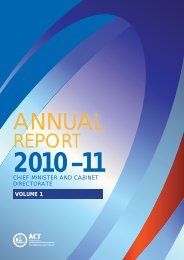Governing the City State - Chief Minister and Treasury Directorate ...
Governing the City State - Chief Minister and Treasury Directorate ...
Governing the City State - Chief Minister and Treasury Directorate ...
Create successful ePaper yourself
Turn your PDF publications into a flip-book with our unique Google optimized e-Paper software.
These risks can be overcome through providing clarity around purpose, scope <strong>and</strong> timeframe,<strong>and</strong> that final decisions will, in most cases, rest with <strong>the</strong> Government. In a democracy,successful community engagement, consultation <strong>and</strong> collaboration should not aim to achievean outcome where everyone will be happy. Processes that seek to achieve that outcome aredoomed to fail, or to never end. Governments are elected to make decisions in what <strong>the</strong>y seeas <strong>the</strong> best interests of <strong>the</strong> citizenry, <strong>and</strong> ultimately live <strong>and</strong> die at <strong>the</strong> ballot box by <strong>the</strong>quality of those decisions. What genuine participatory decision making offers is a breadth ofexperience not o<strong>the</strong>rwise available <strong>and</strong> a shared underst<strong>and</strong>ing of issues against which policy<strong>and</strong> program interventions can be judged.Given <strong>the</strong> ACT’s size, its vocal <strong>and</strong> dem<strong>and</strong>ing citizenry, <strong>and</strong> scope of responsibilities, <strong>the</strong>reis <strong>the</strong> space for participatory practice to contribute significantly to policy <strong>and</strong> program designprocesses, provided it is located in a <strong>the</strong>oretical <strong>and</strong> practical framework that harnesses itspower <strong>and</strong> recognises its shortcomings. Genuine engagement is measured on a qualitative<strong>and</strong> not quantitative scale – <strong>the</strong> number of participants <strong>and</strong> volume of <strong>the</strong>ir contributions(especially from <strong>the</strong> “usual suspects”) does not of itself measure <strong>the</strong> degree of engagement orindicate <strong>the</strong> extent to which <strong>the</strong> processes is adding to <strong>the</strong> Government’s decision makingprocess. There are risks – political <strong>and</strong> o<strong>the</strong>rwise – of which <strong>the</strong> Government <strong>and</strong> <strong>the</strong> ACTPSshould be mindful in <strong>the</strong> overuse of engagement methods ranging from “engagement fatigue”to, at best, criticism of delays or failure to take decisions <strong>and</strong>, at <strong>the</strong> worst, decision-makingparalysis.A deeper underst<strong>and</strong>ing of when inclusive processes work, what conditions are necessary tomake <strong>the</strong>m work, <strong>and</strong> <strong>the</strong> skills public service managers need to deploy in making <strong>the</strong>mwork, are essential if <strong>the</strong> ACTPS is to harness <strong>the</strong> rich stream of insight <strong>and</strong> underst<strong>and</strong>ingthat can be unlocked if this approach is deployed appropriately <strong>and</strong> effectively. Perhapsabove all, <strong>the</strong> Government will need to strike <strong>the</strong> appropriate balance between deciding on itsown, sharing decision making on some issues, <strong>and</strong> engaging with <strong>the</strong> citizenry to improveoutcomes <strong>and</strong>/or <strong>the</strong> acceptance of outcomes on o<strong>the</strong>rs.It will also be necessary to manage <strong>the</strong> tension between representative Westminsterdemocracy <strong>and</strong> participatory decision making processes:At present, representative democracy <strong>and</strong> participatory working are cast in conflicting roles,but both have vital strengths in a strong <strong>and</strong> healthy society. There is clearly a need to explore<strong>the</strong> ways in which <strong>the</strong> civic energy apparent in new participatory working, <strong>and</strong> <strong>the</strong> experienceof decision-making in <strong>the</strong> public interest from years of representative democracy, can bebrought toge<strong>the</strong>r. 82This is a challenge to which <strong>the</strong> ACTPS will need to rise if it is to unlock <strong>the</strong> benefits ofPublic Value Management, but it is an issue with which <strong>the</strong> ACT Government has alreadybegun to engage. As a starting point, CMD has conducted research on preferred methods ofcommunity engagement. Perhaps unsurprisingly <strong>the</strong> report concludes:82 Involve (2005) p.24<strong>Governing</strong> <strong>the</strong> <strong>City</strong> <strong>State</strong>: 67



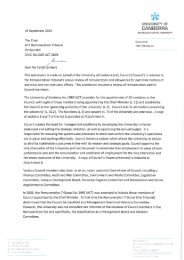
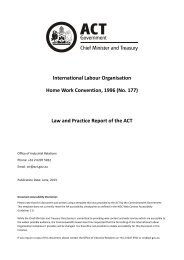
![HSR Training Programs Guidelines [ PDF 191KB]](https://img.yumpu.com/51348280/1/190x245/hsr-training-programs-guidelines-pdf-191kb.jpg?quality=85)



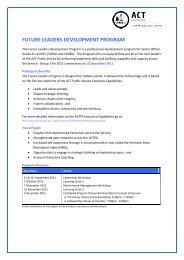

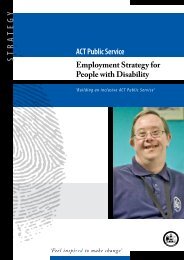
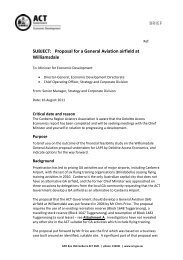
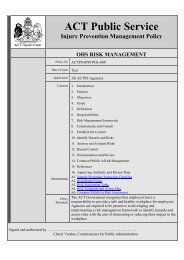

![Teachers Technical and Further Education [ PDF 68KB]](https://img.yumpu.com/34230751/1/184x260/teachers-technical-and-further-education-pdf-68kb.jpg?quality=85)
